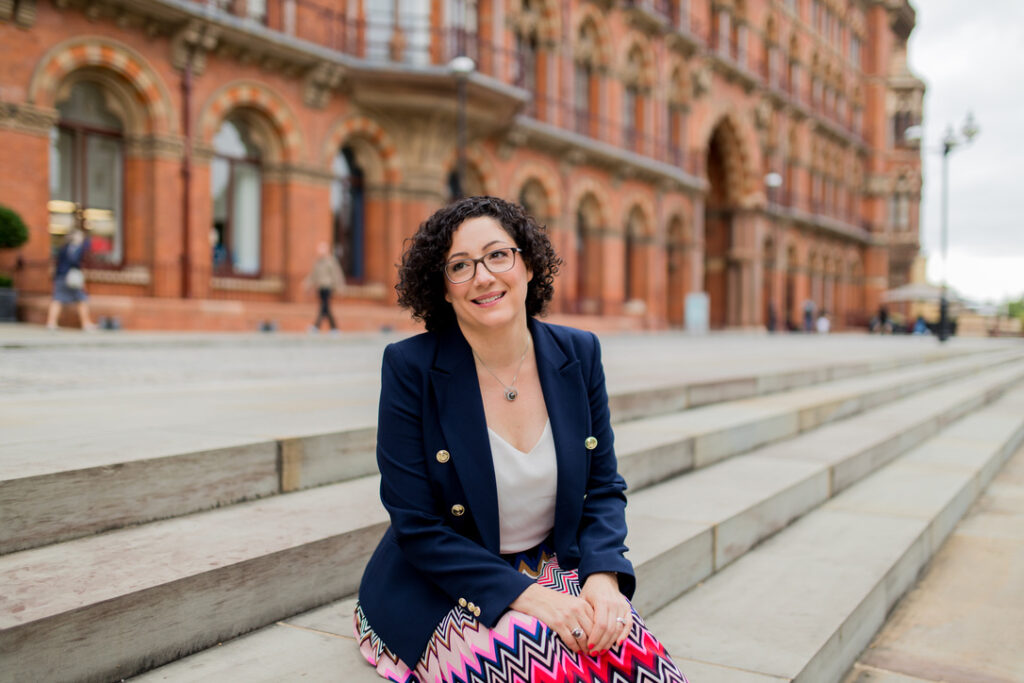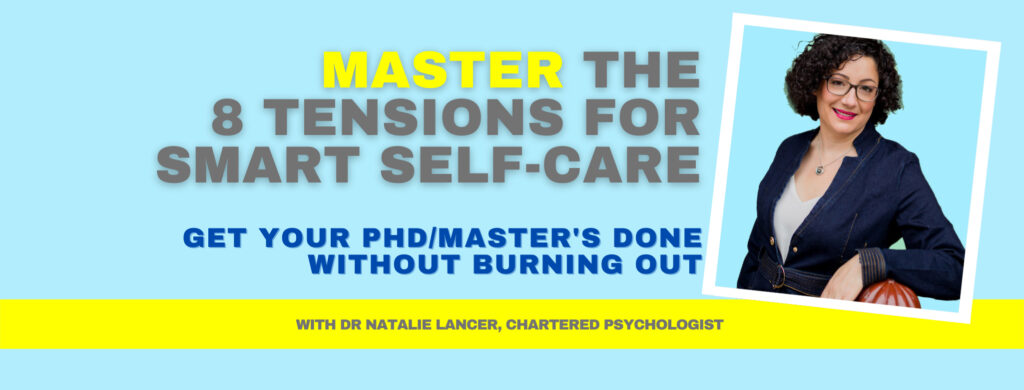Without you, your work is non-existent. You owe it to yourself and the world to make sure you are in the best possible form when doing your work.
Self-care is a phrase that is commonly discussed but advice rarely extends beyond meditating, taking a bath or going for a walk. And yet, exercising these tips didn’t scratch the surface for me personally when I did my Master’s and PhD.
Don’t get me wrong, meditation, hot baths and other well-being rituals can be powerful. But there are additional tools for self-care that need sharing – as different things work for different people.
Everyone needs support and it is a mark of strength to acknowledge this. If you value taking a pre-emptive approach to burn out and regularly checking in with yourself and others on your well-being then the Smart Self-Care Programme is for you.
What is the Smart Self-Care and Personal Growth Programme?
Life is hard to manage at the best of times, but throw a PhD or other huge projects into the mix and then you can feel a bit off kilter. The Smart Self-Care Programme teaches you how to manage your self, your time, your knowledge acquisition, your planning and processes, your work, your relationships, your motivation and your flow, all within an existential psychological framework.
It will teach you how to track your existential quandaries and experience the dynamism of the 8 tensions as a source of energy and zest. People track steps and eating habits. Why not existential quandaries?
At school, no-one ever taught you study skills, which is the one thing you actually need to learn; master that and then you can learn anything. Similarly, academics traditionally don’t speak openly about skills you need to manage your self in order to manage your PhD. You are the greatest asset of your work. Keep yourself re-invigorated the smart way.nd one to one coaching.

What’s involved?
- The programme is for ten months. It starts with an introductory module where we understand the existential psychological framework and key principles, and then each month, we go deep on one of the Eight Tensions.
- You get sent a pre-recorded video to watch explaining both sides of the tension.
- You also get sent exercises you can complete to help you figure out where you are on the existential quandary and how you can move to where you want to be.
- You can discuss your answers to these exercises in our private Slack group. At the end of our examination of the eight tensions there is a ‘tying it all together’ module.
- Four times a month we have a Zoom group coaching call to discuss the month’s tension, our take on it and to set intentions, with a focus on practical steps we can take to get there. There are four slots to choose from – Tuesdays 2.30pm-3.30pm, Tuesdays 7pm-8pm, Wednesdays 10.30am-11.30am and 1.30-2.30pm UK time. The four dates per month will be sent to you in advance. You are welcome to attend all or to pick one or another.
- You also get four one-to-one half hour coaching sessions with me, which you can book in at any point over the ten months. I suggest booking in a session after every two tensions.
- Each participant gets an Eight Tensions tracker e-journal to track their existential quandaries which we discuss in the group and one to one coaching.
"This is the best investment I could possibly make in my PhD".
"In the last week since my coaching session with Natalie, I've made more progress than I have all year".
"I wanted to say a huge thank you for the wonderful course that you have run. I have found it so useful on many different levels. It has really helped me to approach my PhD in a different way and has given me so many ideas and techniques that I use regularly". Alice Talleux, First year PhD student, Durham University
When can I join?
You can join straight away. It is a rolling programme and you will join in the next monthly call and discuss that month’s tension.
What happens when I join?
As soon as you sign up, you get sent the introductory module, your invitation to Slack and your welcome pack, which includes the Eight Tensions e-journal and a link to my calendar so you can book in your one to one coaching sessions straight away.
You will then be sent that month’s module and exercises which you can do ready for our monthly group coaching call.
How much is it?
It is £99 a month with a ten month commitment. Go here to pay:
If you want to pay in one go, you get a month free – so it costs £891
Who can join?
Smart self-care and personal growth is open to all academics in the broadest sense at any stage of their journey, including Masters and PhD students, researchers, lecturers and life-long learners.
Who am I?

I am Dr Natalie Lancer, Chartered Psychologist, writer, public speaker and coach. I have published several articles on the Eight Tensions Framework – the core of the Smart Self-Care Programme. I am the Secretary of the Coaching Division of the British Psychological Society. I will be your coach over the next 12 months to help you implement Smart Self-Care and personal growth.
More information
You are welcome to book a 15 minute no-obligation call with me to check this Programme is right for you. Click below to book
Let me help you manage yourself so you can bring your whole self to your work, family and other commitments to your research and beyond.
“When I started the Smart Self-Care and Personal Growth Programme, I was feeling exhausted, without hope and energy. I thought I would never finish my PhD and I was struggling to find the motivation to write my thesis. Week after week, Natalie created a safe online environment to discuss the challenges that come with a PhD programme and in life in general, and week after week I started to feel more and more empowered. I learned how to describe and articulate the experiences I was going through, and I started dealing with the obstacles that were preventing me from fully focusing on my PhD project. Day by day, I started to appreciate this learning opportunity again. The programme is firmly grounded in up-to-date philosophical and psychological research, carefully broken down for us to grasp it without ever feeling overwhelmed. The exchanges I had with other PhD students during Natalie’s programme made me realise that my struggles were unfortunately the norm and, above all, that there are concrete strategies that we can implement on a day-to-day basis to have a healthier and more balanced life, while working successfully on our PhDs. It was an incredibly freeing and enlightening experience for me. I would recommend without a doubt Natalie’s programme not only to PhD students but also to institutions that are seeking ways to concretely support their students and to equip them with the necessary pragmatic skills to cope with the difficulties that emerge during a PhD degree. After a long period of self-doubt, I am now near the end of my thesis and I feel determined and hopeful again. This was by far the best training I received over the course of my PhD programme as a whole.”
Third Year,
Modern Languages PhD student, University of Cambridge
“I found the ideas inspiring and the sessions allowed time to reflect on my approach to my academic work. Natalie creates a welcoming and inclusive environment for academics to share their issues, large or small, and feel much less isolated in their PhD journey. I now have several tools and methods to identify when I’m stuck and how to get back on track and up my productivity.”
First year PhD student, University of Leeds
“Commencing a PhD was a huge change in direction for me after working in the NHS for five years. Certainly I was excited, but also apprehensive, with a huge side helping of imposter syndrome.
Having been signed off from work twice in the time I was there, I was acutely aware I had four years of my next venture ahead of me, so I wanted to make sure I took opportunities that might help keep me well for its duration.
Smart Self Care has helped me see myself, my studies, and the connections between them from different perspectives, whilst building a network with other PhD students. Everyone experiences programmes differently; for me, three keywords are clear: awareness, confidence, ownership. By participating in Smart Self Care, I have been able to make associations and generate nuggets of insight that I will be able to take with me to help navigate the rest of my PhD journey and career beyond.”
Joanne
University of Surrey
“The Smart Self-Care and Personal Growth Programme has given me the opportunity to think about my process of work for the PhD and work out what I can change and adapt and what I can’t. I have had many ‘lightbulb moments’ throughout the programme. Highly recommend.”
Second year PhD student, Birkbeck, University of London.
“I’ve done the self-care programme twice now….and probably will again!
It has really changed the way I approach my PhD. The 8 tensions method makes you realise how the PhD is a journey more than a destination, a journey with ups and downs. This really helped me during a lengthy period of ill health and burnout. It’s not about taking time out to have a bath and light candles, it’s about making little adaptations, bit by bit, throughout your PhD. In particular, thinking about my daily/weekly/monthly routines helped me to change how I work – a lot more productively with a lot less guilt. I’ve totally changed how I plan so that my work is more manageable. The great thing is that you can always refer back to the tensions when you need a period of reassessing your progress.
Videos and transcripts are provided so that you can read/watch the sessions in your own time then meet up with Natalie and other students online once a month. Meeting with others on their PhD journeys really helped me to know I’m not alone and that each of us have a unique journey. It’s been so insightful learning about how to manage fluctuating tensions that apply not just to the PhD but to life more generally, I feel like I’ve got a much better PhD/life balance now – thank you Natalie!”
Rachel Reay, PhD student, Durham University
“I did the Smart Self Care and Personal Growth course and got a lot out of it. Actively engaging with the eight existential tensions that students grapple with, and their grounding in existential psychology, was very worthwhile and good food for thought, especially when paired with the individual coaching sessions that were included. The study hubs and the creativity exercises related to them were great for thinking around my subject, work habits and time scales in a useful way, and I enjoyed meeting people as well. I always felt motivated in the presence of Natalie’s proactive attitude! She is an encouraging and non-judgemental professional with a no-nonsense approach – just the kind of person needed for coaching PhD students!”
Anonymous

